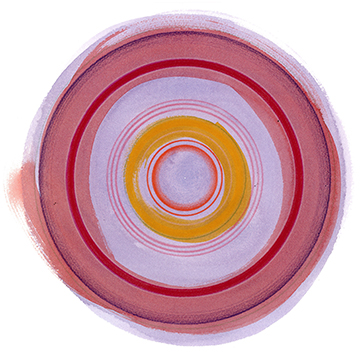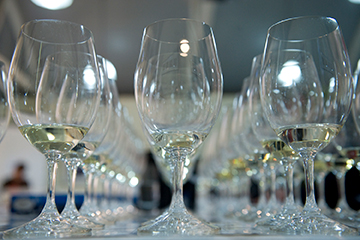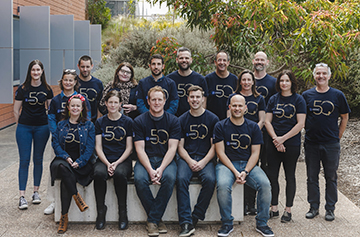Order the latest AWRI staff publications online
Accessing the latest AWRI publications is easy. Visit the AWRI Publications web page to:
- View the 10 most recent AWRI staff publications and order the articles online from the AWRI Library
- Search the staff publications database
- Read the full-text of ‘Technical Notes’ from Technical Review (PDF format)
- Read the full-text of ‘AWRI reports’ and ‘Vineyards of the world columns’ published in Wine & Viticulture Journal (PDF format)
- Read the full text of ‘Ask the AWRI columns’ published in Australian & New Zealand Grapegrower & Winemaker
The AWRI’s most recent publications are listed below.
2109 Essling, M. Ask the AWRI: regulatory changes to the use of botrytis agrochemical. Aust. N.Z. Grapegrower Winemaker (668): 48-49; 2019.
2110 Bindon, K.A., Kassara, S., Solomon, M., Bartel, C., Smith, P.A., Barker, A., Curtin, C. Commercial Saccharomyces cerevisiae yeast strains significantly impact Shiraz tannin and polysaccharide composition with implication for wine colour and astringency. Biomolecules 9(9): 466; 2019.
2111 Coulter, A., Cowey, G., Essling, M., Hoare, T., Holdstock, M., Longbottom, M., Simos, C., Johnson, D. Vintage 2019 – observations from the AWRI helpdesk. Wine Vitic. J. 34(4): 27-29; 2019.
2112 Dry, P. Corvina. Wine Vitic. J. 34(4): p. 59; 2019.
2113 Stanstrup, J., Broeckling, C.D., Helmus, R., Hoffmann, N., Mathé, E., Naake, T., Nicolotti, L., Peters, K., Rainer, J., Salek, R.M., Schulze, T., Schymanski, E.L, Stravs, M.A., Thévenot, E.A., Treutler, H., Weber, R.J.M., Willighagen, E., Witting, M., Neumann, S. The metaRbolomics Toolbox in Bioconductor and beyond. Metabolites 9(10): 200; 2019.
2114 Ratnayake, S., Stockdale, V., Grafton, S., Munro, P., Robinson, A.L., Pearson, W., McRae, J.M., Bacic, A. Carrageenans as heat stabilisers of white wine. Aust. J. Grape Wine Res. 25(4): 439-450; 2019.
2115 Walker, R.R., Blackmore, D.H., Clingeleffer, P.R., Holt, H., Pearson, W., Francis, I.L. Effect of rootstock on yield, grape composition and wine sensory attributes of Shiraz grown in a moderately saline environment. Aust. J. Grape Wine Res. 25(4): 414-429; 2019.
2116 Parker, M., Onetto, C.A., Hixson, J.L., Bilogrevic, E., Schueth, L., Pisaniello, L., Borneman, A., Herderich, M.J., de Barros Lopes, M.A., Francis, I.L. Factors contributing to interindividual variation in retronasal odor perception from aroma glycosides: the role of odorant sensory detection threshold, oral microbiota and hydrolysis in saliva. J. Agric. Food Chem. DOI: 10.1021/acs.jafc.9b05450; 2019.
2117 Cowey, G. Ask the AWRI: What does the latest research say about barrel sanitation against Brett? Aust. N.Z. Grapegrower Winemaker (669): 76-77; 2019.
2118 Romanini, E., McRae, J.M, Colangelo, D., Lambri, M. First trials to assess the feasibility of grape seed powder (GSP) as a novel and sustainable bentonite alternative. Food Chem. 305: 125484; 2019.
2119 Longbottom, M. Ask the AWRI: Sustainable Winegrowing Australia. Supporting the nation’s growers and winemakers in demonstrating and improving their sustainability. Aust. N.Z. Grapegrower Winemaker (670): 45-46; 2019.
2120 Scrimgeour, N., Wilkes, E., Bartowsky, E. Making sense of yeast assimilable nitrogen (YAN). Aust. N.Z. Grapegrower Winemaker (670): 47-50; 2019.
2121 Wilkes, E., Wheal, M. Elements of wine … nearly every known naturally occurring element has been found in at least some wines … Chem. Aust. (November/December): p. 37; 2019.
2122 Pearson, W., Schmidtke, L., Francis, I.L., Blackman, J.W. An investigation of the Pivot© Profile sensory analysis method using wine experts: comparison with descriptive analysis and results from two expert panels. Food Qual. Pref. DOI: 10.1016/j.foodqual.2019.103858: 2019
2123 Hirlam, K., Scrimgeour, N., Wilkes, E. The impact of temperature fluctuations on closure performance. Aust. N.Z. Grapegrower Winemaker (671): 59-61; 2019.
2124 Godden, P. Ask the AWRI: Grape solids in white winemaking. Aust. N.Z. Grapegrower Winemaker (671): 73-74; 2019.
2125 Johnson, D. 2019 Report. Aust. N.Z. Grapegrower Winemaker (671): 4p.; 2019.
2126 Watson, F.T., Smernik, R.J., Doolette, A.L. Thermal degradation of phytate produces all four possible inositol pentakiphosphates as determined by ion chromatography and 1H and 31p NMR spectroscopy. Phosphorus Sulfur Silicon Relat. Elem. 194(12): 1140-1148; 2019.
2127 Luo, M., Li, H., Chakraborty, S., Morbitzer, R., Rinaldo, A., Upadhyaya, N., Bhatt, D., Louis, S., Richardson, T., Lahaye, T., Ayliffe, M. Efficient TALEN-mediated gene editing in wheat. Plant Biotechnol. J. 17(11): 2026-2028; 2019. |





